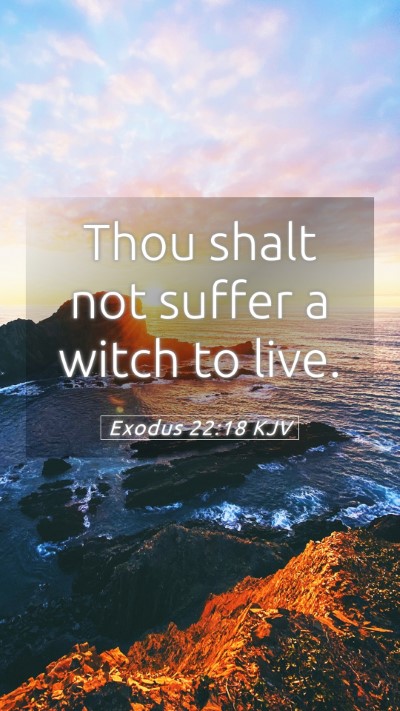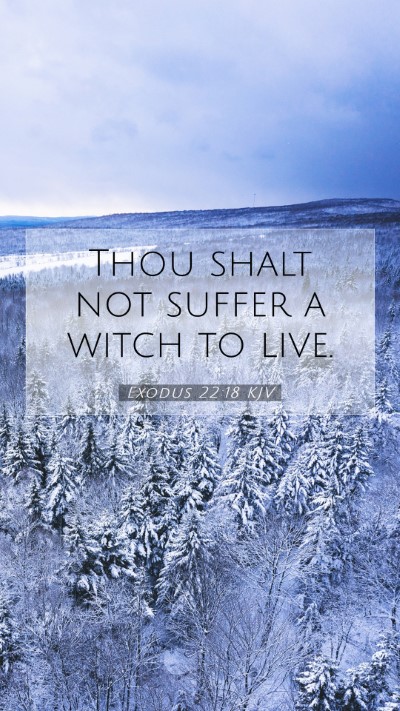Understanding Exodus 22:18
Exodus 22:18 states, "You shall not permit a sorceress to live." This verse addresses the severe prohibition against sorcery and witchcraft in ancient Israelite society. Let's explore the insights from public domain commentaries to deepen our understanding of this scripture.
Bible Verse Meaning
According to Matthew Henry, this verse reflects God's holiness and the seriousness of idolatry and occult practices that were prevalent among the surrounding nations. The phrase "sorceress" refers to women who engaged in magical practices, believed to invoke powers contrary to God’s will. Henry emphasizes that the spiritual purity of the community is paramount and that God’s law demands a strict stance against any form of sorcery that could lead others astray.
Albert Barnes adds to this by illustrating that the punishment prescribed is not merely punitive but serves as a deterrent. The act of allowing sorcery undermines the social and religious fabric of society. Barnes states that the death penalty reflects the degree of divine judgment against such abominations. He also notes that this law was specifically given in the context of covenantal fidelity, demonstrating the serious repercussions for those who violated their covenant with God.
The commentary by Adam Clarke expands on the societal implications of this law. He mentions that sorcery was not just a personal sin but a communal threat that could bring disaster upon the nation. Clarke discusses the importance of protecting the moral and religious standards set forth in the Mosaic Law and how such laws were intended to preserve the community's integrity and honor towards God.
Contextual Significance
- Historical Context: The Israelites were exiting a culture saturated with various forms of paganism, including sorcery. The intention of this command was to protect the nascent Israeli community from falling into the same traps that had ensnared their oppressors in Egypt.
- Theological Implications: This verse underlines God's sovereignty and the expectation that His people maintain spiritual purity. Engaging in sorcery is viewed as a blatant rebellion against God's authority and an affront to the acknowledgment of His power.
Application for Today
In today's context, while the direct application of this verse might not involve sorcery in the same terms, it offers insights on the broader rejection of occult practices. For many believers, Exodus 22:18 serves as a warning of the spiritual dangers that can arise from dabbling in practices considered unholy or contrary to biblical teachings. This applies to various contemporary issues, including the allure of new-age spirituality, divination practices, and any form of occult that does not align with a biblical worldview.
Bible Study Insights
For Bible study groups or individuals engaging in online Bible study, Exodus 22:18 can form the basis for discussions surrounding:
- The importance of maintaining spiritual integrity.
- How ancient laws speak to modern ethical dilemmas.
- Understanding the cultural context of biblical laws and their relevance today.
Cross References
- Leviticus 19:26-31: Further elaborates on prohibitions against occult practices.
- Deuteronomy 18:10-12: Details various forbidden practices, encompassing sorcery and divination.
- 1 Samuel 28: The story of King Saul and the witch of Endor highlights the dangers of engaging with sorcery.
- Revelation 21:8: Provides insight into the consequences of those who practice such abominable acts.
- Isaiah 8:19: Warns against consulting mediums and spirits, underlining God's expectation of turning to Him for guidance.
Conclusion
Exodus 22:18 serves not only as a historical law but as a timeless reminder of the importance of spiritual fidelity. By understanding this verse through the lens of scripture analysis and biblical exegesis, believers can grasp the severity with which God regards practices that seek to undermine His authority. Engaging with this scripture can provide valuable lessons for contemporary issues related to faith, community integrity, and personal spirituality.


